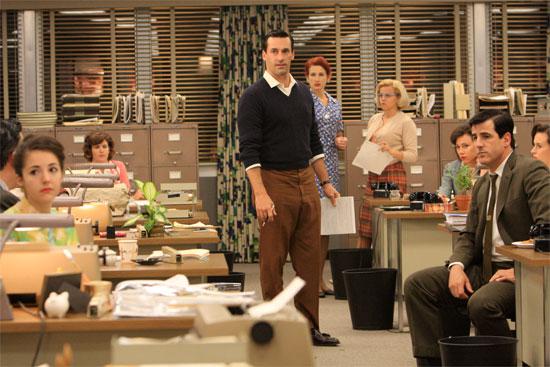Mad Men has had plenty of wham episodes, the installments of a series that change everything. But the show builds to those character reveals and surprise twists of fate slowly. Such water cooler moments are only really rewarding for longtime viewers, who have been present for the gradual raising of the stakes and can fully enjoy the narrative explosions that ensue.
This complicates the search for a suitable gateway episode for the Mad Men uninitiated. Without knowing the juicy backstory, you probably won’t understand the fuss about such episodes. You need a slice-of-life installment, one that will lead you through the show’s universe, pointing out the sights and the not-to-be missed signposts, letting you slowly sink into the characters’ lives and the world they inhabit. Such an episode will help you figure out whether this is a world you really want to spend more time in—ideally without giving too many of the series’ surprises away.
That’s why “Three Sundays,” the fourth episode in Season 2, is the one to watch first. It focuses on three characters: Don Draper (Jon Hamm), creative director at Madison Avenue advertising agency Sterling Cooper; Roger Sterling (John Slattery), the firm’s senior partner; and Peggy Olson (Elizabeth Moss), its junior copywriter. Over the course of three consecutive Sundays, we see the essential struggles and motivations that will drive story arcs for episodes and seasons to come.
The year is 1962, and the Sundays in question are Passion Sunday, Palm Sunday, and Easter Sunday. Setting an episode during Lent six months before the Second Vatican Council changed the Catholic liturgical calendar was surely intentional—the tension between tradition and modernity is probably the most fundamental subject of the show. And understated details like that are one of the best things about the series: There’s always room to argue about such symbolism and subtext. Mad Men rarely confirms, denies, or explains anything.
“Three Sundays” shows us Don’s hyper-competence in the office and his lack of facility at home—he opts out of any real domestic responsibility, ignoring his wife’s increasingly desperate pleas that he get more involved in their family life. We also get hints at how this all connects to his mysterious past. His wife Betty (January Jones) wants him to discipline their son, and asks at one point, “Do you think you’d be the man you are today if your father didn’t hit you?” Halfway into Season 2, our antihero is still only dimly understood by us, but “Three Sundays” provides some (non-spoiler-y) glimpses into what makes him tick.
We also get to know breezy Roger Sterling, a man who’s never met a sensory pleasure he didn’t feel entitled to indulge in. (“But I want everything I want,” he tells an escort.) We know Roger’s own marriage bores him and that he’s cynical about the institution in general. But his understandable longing for romance and companionship gives his hedonism depth, even pathos. And then there’s Peggy Olson, who’s made her way out of the steno pool (and her outer borough upbringing) and into a job as a copywriter. She spends “Three Sundays” excusing herself early from Mass and Sunday dinners in Bay Ridge to escape to Manhattan, in pursuit of an existence more worldly—and with infinitely more possibility—than what she’s been born to.
Mad Men can be stingy about the details that might give us a full understanding of each character—a stinginess you may find frustrating or delicious, depending on your taste in television. “Three Sundays” demonstrates just how well the show manages to reveal and conceal at once, making us feel like we know these people both better and worse than before. And in true Mad Men fashion, after 48 minutes of quality time with the characters, it ends with an enigmatic moment, this one involving a priest, an egg, and Peggy Olson on Easter Sunday. The sooner you watch, the sooner you can start guessing what it all means.
Check out the Gateway Episodes for The Sopranos, Sex and the City, Buffy the Vampire Slayer, and more.
